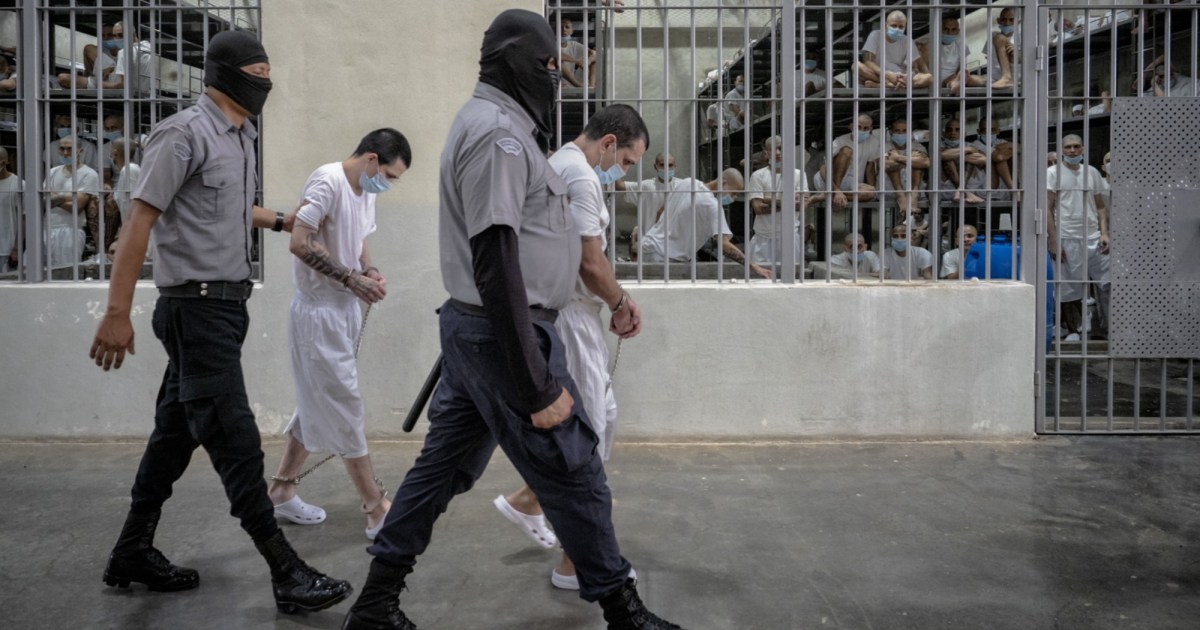On May 30, Frizgeralth de Jesús Cornejo Pulgar was scheduled for a hearing in a United States immigration court. But Cornejo Pulgar—an asylum seeker from Venezuela fleeing potential persecution from paramilitary groups aligned with the government of Nicolás Maduro—was not able to attend the proceeding. The 26-year-old is stuck in El Salvador. He is one of some 230 Venezuelans the Trump administration disappeared, without due process, to the Central American country’s Terrorism Confinement Center (CECOT).
As we reported in March, the rationale for Cornejo’s removal from the United States was flimsy. The government has accused him, and many others, of being members of the Venezuelan gang Tren de Aragua, in no small part because of innocuous tattoos. As a result, they’re facing indefinite detention in a notorious Salvadoran mega prison.
The men have not only been disappeared to a foreign gulag with no clear chance to be released, but also been erased by the US immigration courts.
Now, immigration courts across the United States are abandoning the men held incommunicado at CECOT again. Last Friday, Judge Jason L. Stern in Houston terminated Cornejo’s case, effectively ejecting him from the US legal system. “If the case is still alive,” his lawyer Joseph Giardina said, “you can be like, ‘oh, his case is still pending with the court; it’s still there, return him and let him pick up his case right where it is.’”
Cornejo—who has no criminal history in the United States or in Venezuela and had no final order of removal—has not only been disappeared to a foreign gulag from where he might never be released, but has also been erased by the US immigration courts.
The termination of Cornejo’s case is not an outlier. NBC News reported last week that immigration judges across the country have recently dismissed at least 14 cases of men sent to El Salvador under the Alien Enemies Act without due process. (In early April, the Supreme Court unanimously agreed that noncitizens subject to removal under the wartime statute are entitled to a “meaningful opportunity” to fight their deportation.)
One of the cases dismissed was that of Andry José Hernández Romero, a gay makeup artist who was seeking asylum because of fear of persecution in Venezuela due to his sexual orientation and political position. US Immigration officials interpreted Hernández Romero’s wrist tattoos of crowns with the words “Mom” and “Dad” as a sign of membership in the Venezuelan gang Tren de Aragua, even though experts have repeatedly dismissed tattoos as a reliable identifier of affiliation with the group.
Last week, Paula Dixon, a judge at the Otay Mesa immigration court in San Diego, sided with the Department of Homeland Security’s request to dismiss his asylum proceedings. Hernández Romero is one of the main plaintiffs in a class action lawsuit challenging the Trump administration’s invocation of the Alien Enemies Act and seeking the men’s return to the United States.
“DHS is doing everything it can to erase the fact that Andry came to the United States seeking asylum and he was denied due process as required by our Constitution,” Lindsay Toczylowski, an attorney representing Hernández Romero and president of the Immigrant Defenders Law Center, said in a statement. “The idea that the government can disappear you because of your tattoos, and never give you a day in court, should send a chill down the spine of every American.”
As Mother Jones previously recounted in the investigation “You’re Here Because of Your Tattoos,” Cornejo came to the US-Mexico border in June 2024 after applying for an appointment through the Biden-era CBP One application that allowed migrants to present lawfully at a port of entry. But like Hernández Romero, he has tattoos that were likely the reason the Trump administration targeted him for removal to El Salvador:
In messages to his family from detention, Frizgeralth [de Jesús Cornejo Pulgar] expressed concern he was being investigated because of his tattoos. He explained that none of the 20 or so images—including one on his chest of an angel holding a gun—he has tattooed on his body have any connection to gang activity. He also described feeling discouraged from hearing stories in detention of Venezuelans who had recently been re-detained and said ICE agents picked them up over suspicions about their tattoos.
Frizgeralth even had a declaration from his tattoo artist confirming the harmless nature of the artwork. “I never imagined being imprisoned just for getting a tattoo,” Frizgeralth, who owns a streetwear clothing brand wrote. “I never imagined being separated from my family. I wouldn’t wish this on anyone, not even my worst enemy if I had one. It’s horrible, it’s mental torture every day.”
Most of the Venezuelans flown to El Salvador and labeled “alien enemies” and “heinous monsters” by the government had no US criminal history. A recent ProPublica investigation based on DHS records found that Trump administration officials knew that only 32 out of the 238 men had been convicted of crimes, and even fewer for violent offenses.
“The idea that the government can disappear you because of your tattoos, and never give you a day in court, should send a chill down the spine of every American.”
Like Cornejo, dozens of others removed without being able to dispute the allegations made against them had pending asylum petitions in the United States. Their summary removal deprived them of an opportunity to go before an immigration judge and make their cases to be allowed to stay in the country.
The men stuck in President Nayib Bukeles’ maximum-security prison and unable to attend their hearings in US courts have all but become “ghosts,” as the New Yorker’s Jonathan Blitzer writes. Since March, a network of immigration lawyers and advocates has mobilized to appear as friends of the court on their behalf in hopes of keeping a record of the cases and preventing them from being tossed out.
Laura Lunn, director of advocacy and litigation at the Rocky Mountain Immigrant Advocacy Network, said US Immigration and Customs Enforcement (ICE) has repeatedly refused to provide information about the deportees’ whereabouts. “I think that was a pretty shocking moment,” she said, “where you have government attorneys speaking to a judge, but unable to tell the judge where the person is other than to say they’re no longer here.”
In some instances, immigration judges have ordered the men deported in absentia, even though their failure to show up in court is a direct result of the government’s actions. “It’s obviously an absurd outcome,” Toczylowski told Mother Jones in April. “Immigration courts have long been places where the due process rights of immigrants—particularly detained immigrants—are trampled by the Justice Department. But to see that happening in such a clearly absurd situation as this where the government has rendered someone to El Salvador and to have an immigration judge then rule that, by virtue of that person being held by [US Immigration and Customs Enforcement] in a foreign country, they should have a removal order against them for not showing up to court, is just a truly new level of absurdity.”
In Cornejo’s case, Giardina said, the federal government filed a notice to the Executive Office for Immigration Review (EOIR), the Justice Department’s branch that runs the immigration courts, stating that Cornejo had been removed—without ever conceding that he had been sent to CECOT. “No one wants to call a spade a spade and own up to what happened,” Giardina said. “Why are we talking in circles about something when we all know what the situation is?”
Still, the government joined in a motion for a continuance to keep Cornejo’s case on the docket. So, the Louisiana-based attorney was surprised when Judge Stern decided to overrule both parties’ positions and dismiss his client’s case altogether on the basis that the court has limited jurisdiction now that Cornejo is outside the United States. Alternatively, the judge could have temporarily paused the case and put it on the back burner.
If circumstances change and Cornejo is somehow returned to the United States, he will have to file a motion to reopen his case. Giardina said he plans on appealing the judge’s decision to the Board of Immigration Appeals (BIA). And while it was within the judge’s purview to terminate Cornejo’s case, he said, “it’s incredibly undiscerning to not look at the actual facts of the situation and acknowledge that even if I can black and white do this, I probably shouldn’t.”















